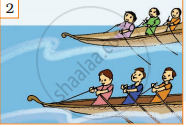Advertisements
Advertisements
Question
What does the reader learn about the characters of the narrator and the old man, in Ernest Hemingway “Old Man and the Bridge?
Solution
The narrator seems to be with the army that is anticipating the attack of the enemy from somewhere beyond the bridge. The narrator may be a scout of some kind. He tells us * that his job is to cross over the bridge, assess how close the enemy is and return. He notices the old man as he crosses the bridge to do his job, and when he returns, although most of the peasant traffic has gone, he finds the old man still there. He strikes up a conversation with the elderly gentleman and tries to encourage him to move on to a safer location.
The old man has left San Carlos, his home town and he reports that he was the last to leave, departing only because of the danger of artillery fire. The elderly man reports that he has no politics, taking neither side in the war raging around him. He also says that he has no family. The old man says that he was in San Carlos caring for animals:two goats, a cat, and four pairs of pigeons. The soldier tells the old man that he really had to leave because of the danger he faced due to the advancing enemy.The old man is exhausted and having a hard time finding the energy to move on. He tells the soldier (narrator) about the animals. He is worried about what would happen to them; if it was dangerous for him, would it not also be dangerous for the animals?
The soldier tries to comfort the man, and once again encourages him to leave, but the old man becomes more mentally unfocused; and when he rises, he sways and sits back down.
Finally, when the soldier leaves, the old man is still seated next to the bridge.
APPEARS IN
RELATED QUESTIONS
Which of these words would you use to describe Santosh Yadav? Find reasons in the text to support your choices, and write a couple of paragraphs describing Santosh’s character
| contented | determined | resourceful | polite | adventurous | considerate |
| weak-willed | fearful |
independent |
pessimistic |
patient | persevering |
How is the last verse different from the other verse? Is the poet deriving a different mood than that expressed in the previous verse?
What is the primary purpose of “Hearts and Hands” by O. Henry?
What is the setting of “All Summer in a Day”?
Don John: Come, let us to the banquet
[Exeunt all but Claudio]
Claudio: Thus answer 1 in name of Benedick,
But hear this ill news with the ears of Claudio. 'Tis certain so; the prince woos for himself. Friendship is constant in all other things Save in the office and affairs of love. Therefore all hearts in love use their own tongues. Let every eye negotiate for itself, And trust no agent; for beauty is a witch Against whose charms faith melteth into blood. This is an accident of hourly proof, Which I Mistrusted not. Farewell, therefore, Hero.
[Enter Benedick]
Benedick: Count Claudio?
Claudio: Yea, the same.
(i) Where are the speakers? Describe Claudio's state of mind?
(ii) What has Don John just revealed to Claudio?
(iii) Explain the lines:
"Therefore all hearts in love use their own tongues.
Let every eye negotiate for itself,
And trust no agent;"
(iv) How does Don John succeed in conveying his thoughts to Claudio? What is his intention in doing so?
(v) Why is 'beauty' said to be a 'witch'? Which aspect of Claudio is seen here?
(vi) Give the meanings of the following words as they are used in the context of the passage: ill; save; office;
How did the narrator and Lord Otori overpower the intruder?
Discuss the following statement in groups of four.
“The landscape is an inner one, a spiritual and conceptual space.”
Discuss the following with your partner and complete the following sentence.
Food adulteration means _________________.
Taking clues from the lists on the board, complete the following chart.

Answer the question by looking at the picture.
Example: What is happening in picture 5?

